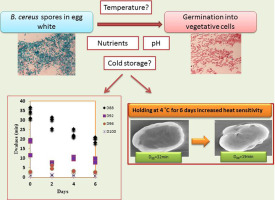Food Research International ( IF 8.1 ) Pub Date : 2018-01-08 , DOI: 10.1016/j.foodres.2018.01.006 Aswathi Soni , Indrawati Oey , Patrick Silcock , Phil J. Bremer

|
B. cereus spores are a concern to the food industry, especially to the producers of heat sensitive food products like egg white or precooked and stored food such as fried rice. This study investigated the impact of nutrients, temperature (4, 8, 15 and 25 °C), pH (4, 5, 7 and 9), and cold storage on the germination, growth and resistance of B. cereus spores. In egg white held at 4 °C for 12 days spore germination was not apparent, however the addition of egg yolk (5%) resulted in a 2 Log colony forming units (CFU)/mL increase in vegetative cells (p < .05). Adding l-alanine (0.9 mg/mL) to egg white did not induce germination unless the spores were simultaneously heat activated at 70 °C for 30 min. On incubation at 15 or 25 °C in egg white, spore germination increased by 3.0 Log and 3.7 Log CFU/mL on day 12. The presence of 5% yolk further enhanced germination and subsequent sporulation during storage at 15 and 25 °C. Acidification (pH 4) of 10% egg white solution prevented germination at 4, 8, 15 and 25 °C. Spores held at 4 °C for 6 days in phosphate buffer (50 mM, pH 4) had visible deformations on their surface (scanning electron microscopy) and a significant reduction in D88, and D92 values of 13.9 and 8.2 min respectively. A better understanding of how spores sense and respond to changing environmental conditions will help in the development of processing strategies, involving multiple hurdles to ensure the prevention of germination and subsequent toxin production.
中文翻译:

温度,养分,pH和冷藏对蛋清中蜡状芽孢杆菌孢子萌发,生长和抗性的影响
蜡状芽孢杆菌孢子是食品工业所关注的,特别是对热敏感食品如蛋清或预煮和储存食品如炒饭的生产者而言。这项研究调查了养分,温度(4、8、15和25°C),pH(4、5、7和9)和冷藏对蜡状芽孢杆菌孢子萌发,生长和抗性的影响。在4°C下保持12天的蛋白中,孢子萌发并不明显,但是添加蛋黄(5%)会使营养细胞增加2 Log菌落形成单位(CFU)/ mL(p <.05) 。加l除非将孢子同时在70°C加热30分钟,否则蛋清中的-丙氨酸(0.9 mg / mL)不会诱导发芽。在蛋清中于15或25°C孵育时,第12天的孢子萌发增加了3.0 Log和3.7 Log CFU /mL。5%蛋黄的存在进一步增强了发芽和随后在15和25°C储存期间的孢子形成。10%蛋清溶液的酸化(pH 4)可防止在4、8、15和25°C下发芽。孢子在磷酸盐缓冲液(50 mM,pH 4)中于4°C放置6天,表面有明显的形变(扫描电子显微镜),D 88和D 92显着降低分别为13.9和8.2分钟。更好地了解孢子如何感知和应对不断变化的环境条件将有助于制定加工策略,其中涉及多个障碍,以确保防止发芽和随后产生毒素。


























 京公网安备 11010802027423号
京公网安备 11010802027423号